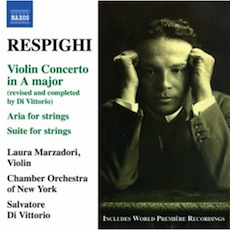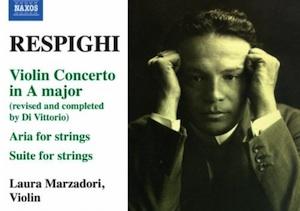
Born in Palermo, Salvatore Di Vittorio has established himself in the U.S. as a composer, editor, and founder of the “Ottorino Respighi” Chamber Orchestra of New York. In this release, he has brought to the fore some early compositions by his band’s namesake, including an incomplete violin concerto, the third movement of which he has finished from the composer’s sketches, plus some extrapolation. The result is pleasant, if sometimes repetitious, listening and a chance to compare a mature Respighi work with his youthful efforts.
The Naxos release makes the mistake of beginning with the 1901 Aria for Strings, a rather unimaginative quasi-dirge in a neo-Baroque style. You might want to hear the piece once to hear what Respighi was doing (or not doing) at age 22, but then you have to program around it ever afterward to get to the significant item on this CD, the 1903 concerto. This second work features a lively, tuneful first movement followed by a subdued, romantic meditation. Di Vittorio wisely and idiomatically finishes the package with a 4½-minute finale from sketch fragments and motives from the first two movements. Respighi probably would not have been pleased, but audiences certainly will have a better feeling of completion listening to this round-off. Laura Marzadori does a fine job with her unchallenging solo violin score.
Listen To The Music
Violin Concerto in A: I. Allegro energetico (excerpt)Rossiniana: III. Intermezzo (excerpt)
Purchase Recording


A portion of each purchase helps
support San Francisco Classical Voice
The 1903 Suite for Strings is next on the program. Again in Baroque style, it begins with the best of its six numbers, a grave chaconne. The tune and chord progression are in two 8-bar sections, the second of which includes a striking three-note phrase that Puccini was writing in the same year, Pinkerton’s “bitter fragrance” entry in the Act 3 Trio in Madama Butterfly. Did the famous man from Lucca peek at Respighi’s score somehow? A Siciliana, a Gigue, a Sarabande, a “burlesque” Vivace, and a Rigaudon follow, none of which strike sparks like the chaconne, yet are guaranteed not to offend.
The last item on the disc has been often recorded, and deservedly so: the Rossiniana suite for orchestra, from 1923. Over the intervening two decades, Respighi progressed from a competent to an extraordinary orchestrator — just listen to the charming Intermezzo. If you really like this piece, you may want to explore fuller sound of larger orchestras on other labels: The “Respighi” orchestra is a tad thin in places, and in others just slightly out of sync. With its size, such infelicities are unfortunately more apparent.
All in all, however, if you’d like some fresh Italian air, you oughta hear this Ottorino.

